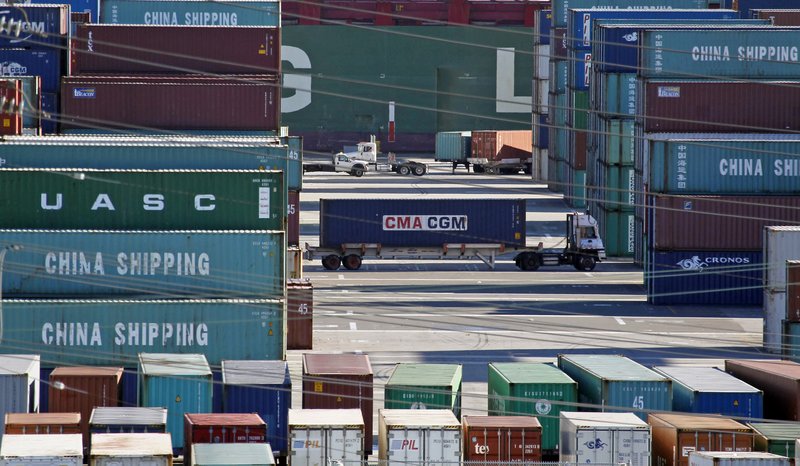WASHINGTON -- The U.S. trade deficit jumped sharply in August as exports fell to the lowest level in nearly three years while imports increased, led by a surge in shipments of cellphones from China.
The deficit increased 15.6 percent to $48.3 billion, the biggest deficit since March, the Commerce Department reported Tuesday. Exports of goods and services dropped 2 percent to $185.1 billion, the lowest level since October 2012. Imports rose 1.2 percent to $233.4 billion.
Exports have been hurt this year by the rising value of the dollar, which makes U.S. goods less competitive on overseas markets, and weaker economic growth in China and other major export markets. Economists say they expect these trends will combine to push the deficit higher and make trade a drag on overall growth this year.
"The overriding issue is exports declining in the wake of a weak global growth environment," said Richard Moody, chief economist at Regions Financial Corp. in Birmingham, Ala. "Trade is clearly going to be a drag on growth."
Canada, America's largest trading partner, is in a recession. And China, the world's second-largest economy, is growing more slowly. Meanwhile, many emerging market economies are suffering from a drop in commodity prices.
Ian Shepherdson, chief economist at Pantheon Macroeconomics, said that the August trade performance showed that trade will be a "significant drag" on growth in the July-September quarter. Shepherdson said he looked for trade to subtract 0.75 percentage point from third-quarter growth.
The overall economy grew at a 3.9 percent rate in the second quarter, but many analysts expect that trade and other factors will slow growth to perhaps as little as 1.5 percent in the third quarter.
The United States on Monday reached agreement with Japan and nine other Pacific Rim nations on what would be the largest regional trade pact in history. But the Obama administration must secure congressional approval for the Trans-Pacific Partnership trade deal. Opponents argue the deal will expose American workers to more unfair foreign competition.
The critics point to America's huge trade deficits as evidence that other nations are manipulating their currencies and pursuing other unfair trade practices that are costing U.S. jobs.
The trade deal was seen as a counterweight to China's efforts to expand its influence not just in trade but in other areas, including its island building in the disputed South China Sea and the establishment of a new regional development bank to compete with Western-led institutions.
"The TPP may not be the game-changer the Americans say it will be, but if the TPP failed, it would certainly have been a blow to U.S. credibility, and its conclusion is to be welcomed," said Bilahari Kausikan, a former permanent secretary of Singapore's Foreign Ministry. Yet, he cautioned: "This is not going to erode what China does."
The trade deal comes as China's position in Asia has been thrown off balance by questions about the condition of its economy, which is expanding at its slowest pace in a quarter century.
For August, the U.S. deficit with China rose 10.7 percent to $35 billion, the highest level in 11 months. So far this year, the deficit with China, the largest with any trading partner, is running 9.5 percent higher than a year ago. It is on track to set another annual record.
The deficit with the European Union rose 9 percent in August to $13.6 billion, while the imbalance with Japan fell 9 percent to $5.2 billion.
The drop in exports reflected lower sales of manufactured goods such as computers, industrial machinery and autos. Shipments of U.S. energy products also fell 9.3 percent to $8.1 billion, reflecting the slump in oil prices.
The rise in imports reflected a $2.1 billion jump in the category that covers cellphones, with many of those imports coming from China. Imports of telecommunications equipment and food products were also up, but imports of oil dropped 11.7 percent to $15.1 billion.
Information for this article was contributed by Martin Crutsinger of The Associated Press; by Michelle Jamrisko of Bloomberg News; and by Jane Perlez of The New York Times.
Business on 10/07/2015

